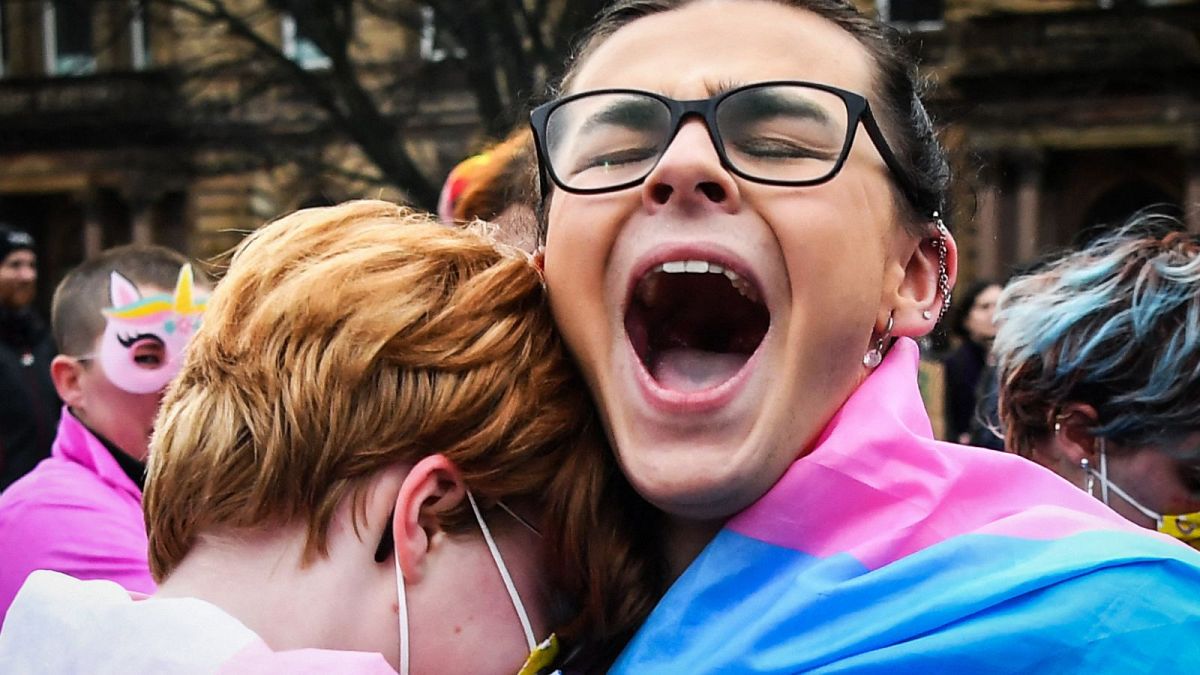Organisations working with young trans people are disappointed by new draft guidance for teachers, saying that a chance to help educators work positively with children has been missed.
New guidance addressing how schools in England should approach trans kids was promised by the British government in 2018, five years ago. But the new draft document advising schools on youth transition, which was finally released on Tuesday, is far from what trans rights activists were hoping for.
The document, which is not yet final nor legally binding, is expected to help teachers and staff handle students who are questioning their gender identity. But trans and LGBTQ+ rights advocates say that instead of aiming to protect trans youth, the draft guidance presents new challenges for trans kids.
Cleo Madeleine of the trans-led grassroots organisation Gendered Intelligence tells Euronews that the group is disappointed with the text, which could have helped educators to positively work with trans kids and instead pushes away LGBTQ+ young people.
While the group agrees with some parts of the guidance – that students need to be respected, for instance, and that schools must prevent bullying and discrimination – it’s also quite concerned about the apparent attempt to prevent trans children from using gender-appropriate facilities and changing rooms and from participating in certain sports and activities.
“It’s unclear to us at the moment how schools would be able to make those restrictions without going against their Equality Act obligations,” Madeleine says. “This is an equality law that says that it’s unlawful to exclude transgender people from things like facilities and activities on the grounds of gender identity.”
The language used in the guidance is also concerning, Madeleine says, because it frames trans children as a problem that needs to be solved.
“Talking about keeping the number of children who socially transition as low as possible or ensuring that teachers are aware that they have the right to not support trans children – while it may be technically true and even viable under equalities law – is fundamentally cruel,” she says.
“All young people deserve an accepting and supportive school environment to learn and be their authentic selves,” a spokesperson for Mermaids, a British charity supporting trans, non-binary and gender-diverse children and young people, tells Euronews.
“The UK Government’s draft trans guidance for schools in England seeks to prevent that. Its approach is unworkable, out of touch and absurd.”
What does the guidance say?
The original concept back in 2018 was very different: to create a document that would offer guidance to teachers to guarantee trans kids “have a happy, fulfilling and equitable school experience,” Madeleine says.
But the political mood has changed since then in the country, and the “political conversation around trans rights has become so toxic and polarised” in the UK that “it's constantly hung up on questions like who gets to use what toilet, or who should be called what pronoun,” she says.
According to the draft guidance, signed off by education secretary Gillian Keegan and minister for women and equalities Kemi Badenoch, schools and colleges facing a student questioning their gender “should seek to understand societal or other factors that may have influenced the child”, including what impact social media and peers might have had on them.
Under the guidance, schools should also engage parents “as a matter of priority” if a child wishes to “socially transition”.
This instruction in particular has been criticised by trans rights activists, who said the guidance could lead to schools outing trans youth to family members who might be hostile.
Additionally, the guidance said that a school should not use a child’s chosen name and pronouns unless the benefit to the individual child outweighs “the impact on the school community”.
Failing to protect trans kids
“Rather than listening to trans young people and reflecting best practices of inclusive educators across the UK, the British government has created more confusion for schools and is putting young people at risk,” the Mermaids spokesperson tells Euronews.
According to the group, it’s difficult to understand how aspects of this draft guidance – including automatically excluding trans pupils from facilities, sports bans, and allowing students to be misgendered – are compatible with existing equalities law.
“The overwhelming majority of teachers and parents believe trans pupils should be safe at school and will disregard these discriminatory guidelines, which will be non-compulsory.”
In a statement shared with Euronews, Stonewall, one of the most prominent LGBTQ+ charities in the UK called the guidance “unlawful and non-statutory,” adding that “the truly shocking thing about this publication is the consistent use of hostile language and anti-trans dog whistles and terminology.”
“Should any school feel obligated to follow this guidance, they will face an immediate risk of isolating marginalised pupils and creating an environment that encourages the bullying of vulnerable children,” the group says.
The guidance is under consultation until 12 March 2024. Groups like Mermaids and Stonewall encourage Britons opposed its contents to take action and ask their MPs to speak out against it.
